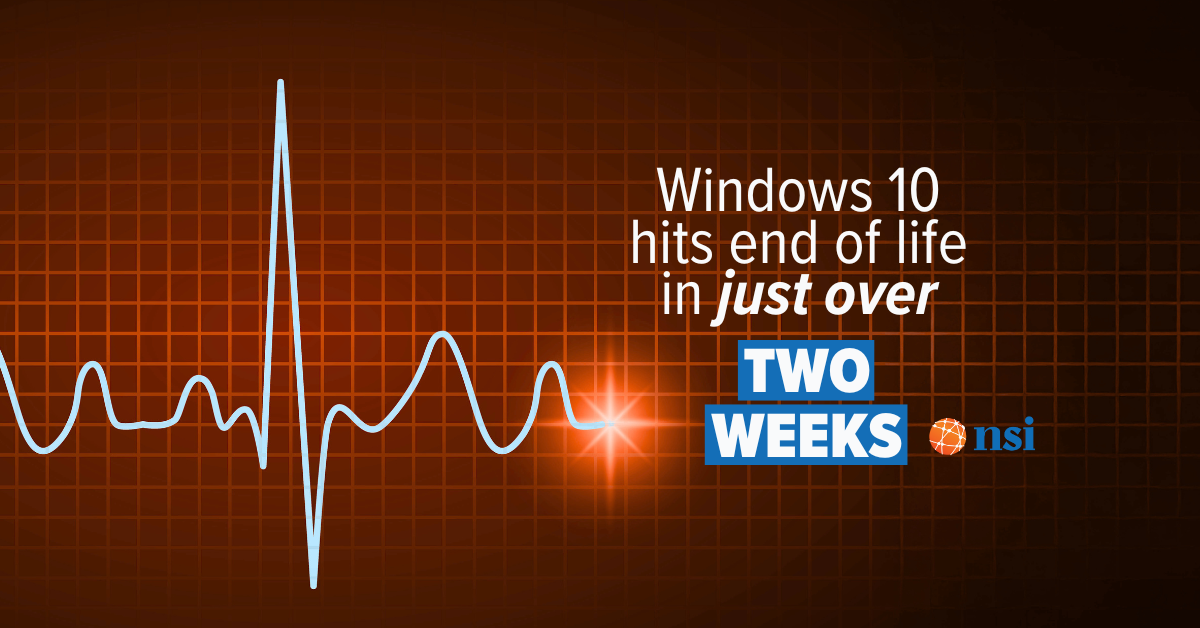Key Takeaways
- Free support for Windows 10 ends in two weeks.
- No more security patches, bug fixes, or technical support from Microsoft.
- Systems running Windows 10 will become prime targets for cyberattacks.
- Extended Security Updates (ESUs) are available—but costly and temporary.
- Upgrading to Windows 11 offers stronger security, better performance, and long-term support.
- Some older devices won’t meet Windows 11 requirements, so planning is critical.
- NSI can guide your migration from assessment to deployment—quickly, securely, and with minimal disruption.
Microsoft is about to pull the plug on free support for Windows 10—and that could leave your business exposed.
In just two weeks, updates and security patches will cease, rendering every Windows 10 machine vulnerable.
If you’re still running Windows 10, the time to act is now. At NSI, we’re here to help you transition safely, ensuring your business remains protected.
Why This Matters to Your Business
When Microsoft ends support, your Windows 10 systems won’t just be outdated—they’ll be vulnerable. Without security updates, cybercriminals can exploit unpatched weaknesses to access your network, steal data, or disrupt operations.
It’s not an exaggeration to say that staying on Windows 10 could bring your business to a standstill. A single breach can cause downtime, financial loss, and reputational damage that takes months (or years) to recover from.
The Problem with “Waiting It Out”
Some companies are hoping to buy time with Microsoft’s Extended Security Updates (ESUs). While ESUs can provide limited security patches, they come with two significant issues:
- They’re expensive—and the price increases each year.
- They don’t add new features or functionality—just minimal protection.
In short, ESUs are only a temporary bandage. They don’t move your business forward, and they delay the inevitable.
Why Windows 11 Is the Smart Move
Windows 11 was built for today’s workplace. It’s faster, more secure, and designed to support hybrid and remote teams. Upgrading gives you access to the latest tools, performance improvements, and ongoing support.
But here’s the catch: not every device can run Windows 11. Older hardware may not meet Microsoft’s requirements. That means you may need to factor in new hardware purchases as part of your upgrade plan—another reason not to leave this decision until the last minute.
How NSI Helps You Upgrade Without the Headaches
At NSI, we specialize in guiding businesses like yours through IT transitions with zero chaos. Our team will:
- Audit your current devices to see which ones qualify for Windows 11.
- Recommend the best upgrade path—whether that’s updating or replacing equipment.
- Handle the migration end-to-end, so your team stays productive during the switch.
We make the move seamless, secure, and fast—so you can focus on running your business, not managing an IT crisis.
The Clock Is Ticking — Let’s Get You Protected
Waiting until Windows 10 support ends could leave your business exposed to cyberattacks and downtime. Please don’t risk it.
Contact NSI today to start your migration plan to Windows 11. We’ll help you upgrade quickly, securely, and with zero stress.
FAQs
How much time do we have left on Windows 10?
Only about two weeks. After that, Microsoft ends all free support and security updates.
Can’t we pay for extended security updates (ESUs)?
You can—but ESUs are expensive, their costs increase each year, and they offer only temporary security coverage without new features.
What if our devices aren’t compatible with Windows 11?
We’ll help you identify which devices qualify and provide guidance on cost-effective replacements if needed.
Will upgrading disrupt our daily operations?
With the proper planning, no. NSI can manage the migration to ensure minimal downtime for your team.
